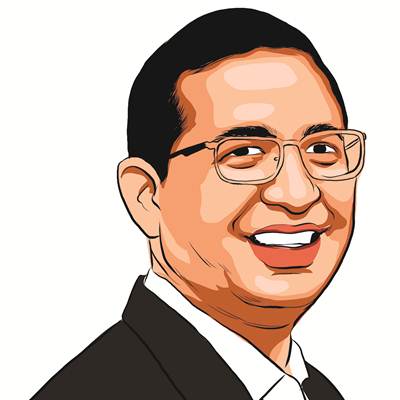Opinion Kapil Sibal is wrong — judiciary’s independence is not under threat
Sibal’s relationship with the Indian judiciary highlights the crucial need to respect the delicate balance between political advocacy and judicial independence
 Former Union Law Minister and member of Rajya Sabha Kapil Sibal
Former Union Law Minister and member of Rajya Sabha Kapil Sibal In the absence of any specific restriction against legislators and politicians practising before courts of law, legislator-lawyers often perform the dual role of law-making and representing their clients. This leads to a curious dilemma, at least in theory, of mixing politics with the law. While the two are not inseparable and eminent political persons have historically risen from the bar, the continuation of political activity while actively practising is a relatively recent trend.
The allegations against the judiciary by senior advocate, former Union Law Minister and member of Rajya Sabha Kapil Sibal in a recent article (‘We Are Witnessing Undeclared Emergency & Courts Are Silent’, LiveLaw, November 27) are symptomatic of this problematic trend — one where political intervention in the judiciary is being normalised. The claim of the “courts being on trial” is a rather sophisticated blackmailing tool that ensures that any unfavourable decision can be easily derided. It cunningly questions the independence of the judiciary, inaccurately describes the core values that the judicial system upholds and seeks orders in particular judicial proceedings.
This critique of the court is based on a false equivalence between the 1975 Emergency and the present times. The Emergency era is unique in Indian constitutional history, wherein constitutional amendments were a dime a dozen, and attempts were made to literally rewrite the Constitution (the 42nd amendment). Some decisions of the Supreme Court during this era, and other interference in judicial appointments and transfers often led to charges of the judiciary being made-to-measure. While lazy comparisons by contemporary columnists may echo these sentiments, they ignore the important role the judiciary currently plays.
The judiciary has in no manner been a mute spectator. Rather, it has expanded its scope of jurisdiction and developed newer forms of judicial review of legislation on vague and subjective grounds like constitutional morality, manifest arbitrariness, transformative constitutionalism, proportionality, etc. Any serious constitutional scholar would admit that in the past decade, the Supreme Court has had a far more intrusive role as a constitutional court. The recent decisions of the Court in matters concerning defections, which seek to keep petitions pending while a Speaker is to act, are not only unwarranted but also directly impact the trust that the Indian public holds in one of the mightiest organs under the Constitution. In the past decade, the standard of judicial review has become more sharp and rigorous. This restricts the role of the democratically elected legislature. In fact, to the chagrin of Sibal perhaps, regular non-political legal practitioners have often criticised this expansionist nature of judicial review.
Sibal is a former Congress leader and is now in search of some political space. His political views, along with his admirable legal acumen, have often conflated politics and judicial spheres. His article leaves no stone unturned in making direct accusations against the Supreme Court’s independence. An addendum to the politician’s commentary mentions that there is no doubt that the Court espouses the cause of liberty for individuals. This seems more like a veil to subdue the effective argument he tries to make, by conveniently ignoring the elephant in the room — that he appears in these courts regularly. His narrative appears to be that the judiciary is currently undergoing a radical shift because of external pressures. His recent comments on institutional sabotage are wildly inaccurate and speculative. Incidentally, they represent the very outside “pressure” that Sibal seeks to criticise. In fact, any extra-adversarial process that seeks to exert pressure on the judiciary to decide cases in a particular fashion is to be eliminated, including by Sibal.
The senior lawyer’s stance against the Supreme Court’s verdicts has consistently drawn attention, bringing him under the spotlight for his views which are not only atypical but evidently charged with political colour. The threat of initiating impeachment proceedings against the then-Chief Justice of India, Dipak Misra was condemned by a cross-section of members of civil society and apparently even by Congress, leading to him withdrawing the writ petition. There is no doubt that it was perceived as an attempt to pressure the judiciary. Though members of civil society have every right to question and criticise institutions and seek accountability from them, wherever necessary, Sibal’s methods are far more confrontational and problematic because of the “hats” he wears.
The impact of this multi-layered undermining of judicial independence affects the functioning of a democracy and it profoundly undermines public trust. While critique and accountability are essential, how these opinions are presented can significantly influence public perception and institutional respect. Additionally, these actions might have a chilling effect on the judiciary’s functioning, potentially influencing future verdicts and legal processes.
An independent judiciary is the cornerstone of democratic governance, and actions perceived as undermining this independence can erode public faith in legal institutions. Any attempt to cower down independent decisions of the Supreme Court, such as deciding to transfer cases from one bench to another, should be viewed from ethical standards that politicians who are also lawyers should pay heed to. Sibal’s relationship with the Indian judiciary highlights the crucial need to respect the delicate balance between political advocacy and judicial independence. This is true even more so for those who possess the privileges of the legislative house and the legal acumen to appear in high-profile cases. In the game of two hats, one must be careful to not lose both.
The writer is Managing Partner, Parinam Law Associates and Vice President, Mumbai BJP






